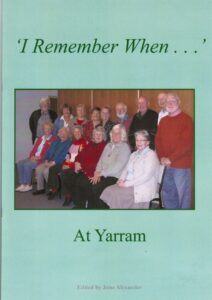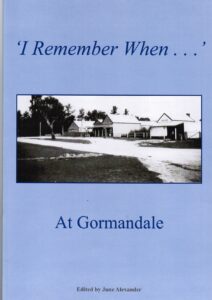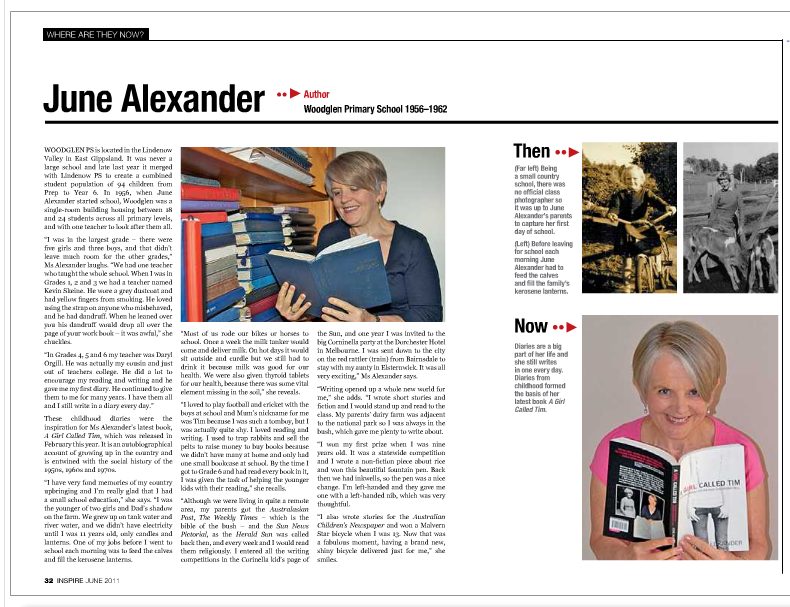The right time to write
The right time to write

A cousin gave me a diary for Christmas when I was 11 years old and I have kept one ever since. My diaries were my biggest resource in writing my memoir.
The right time to write is now.
Holding on to the thought ‘I will write a book about this’, can help sustain hope in the down moments of fighting a challenging illness or trauma. Some people want to start writing immediately. Thinking about this, and preparing for it by keeping a journal, can work wonders in accepting that this horrible experience that is happening will have a silver lining and that, beyond the hurt and pain, there will be a purpose. The suffering will not be in vain. The journey really is as important as the destination. So when do you start writing? Now!
My desire to write a memoir developed in my thirties. The desire was very strong, as strong as wanting to do something when escaping prison. That strong. I wanted to share my story for several reasons: to help my parents and sister to understand my illness; to let others know they are not alone, and to encourage everyone with an eating disorder to seek help immediately. I thought my suffering would be worthwhile if I could help ease the suffering of others. But I did not write my memoir in my thirties. Or forties. I wrote in my diary every day but did not write the memoir until in my late fifties.
The passion to write the memoir never waned. My diaries, kept daily since the age of twelve, were ample resources. Why did I wait so long? I wanted to reach the ‘Everest’ of my recovery. I wanted to feel that I was ‘whole’, that the ‘hole the ED had eaten with in my soul was totally mended’; that I had regained ‘me’, that I had escaped the ‘ED’ prison. This long-held desire, like a life raft tossing in a heavy sea, helped me over the line. I had to take care of myself first to be free to help others.
At age fifty-five, I exalted in ascending my ‘Everest’, and was ready to write about the young eleven year old girl. How could I bring her alive? How could I recall past feelings and perspective?
Diaries made the writing about childhood and adolescence easy in terms of chronology. Also, memories,especially those of my illness, seemed to be trapped a time capsule and remained crystal clear. Being recovered meant I could look at my life from ‘all sides’, inside and outside; I was able to feel sad for the young girl, the teenager, the young mother, imprisoned by her illness for more than four decades, objectively, without triggering illness thoughts.
A Girl Named Tim is not only about me – there were people who loved and cared for me, even if they did not always understand. They had to be acknowledged in my story for they were integral to it.
The network of support by people who loved and cared for me was vital for survival, and recovery. My four children and their dad deserved gold medals for not giving up, for loving me when my behaviour was anything but loveable! Like many mental illnesses, an eating disorder appears to thrive on isolating, dividing and conquering relationships,as well as life. Fortunately I met health professionals who believed in me – a GP, psychiatrist and eating disorder therapist. A small circle of close friends remained supportive. Often they did not understand, but remained loyal; they remained ‘there’ for me. They were part of my journey too. So I have these people, these pieces of the jigsaw that contribute to the representation of my life. Some pieces may need to be discarded because they don’t fit the picture. The challenge is to piece the many parts of the jigsaw together carefully and snugly, so the reader can identify with them, and relate to their own life in an enriching and inspirational way.
Some tips to get started on your memoir
Start today! Carry a notebook at all times so that you can jot down ideas and memories as they occur. Decide what period of life you wish to cover and decide your main reason for writing.
- Decide your audience – this could be yourself, your family or the world.
- Do you plan to self-publish or will you seek a publisher? Aim high!
- Be prepared to allow your story to evolve. Talk to people who know you well, do your research; listen to feedback.
- If you seek a publisher, be prepared to write many drafts. Writing a memoir is like creating a rough stone, such as that picked up off a gravel road, and shining it to reveal the gem within.
I believe everyone has a story to tell. Everyone can write a memoir. Everyone’s life is worthwhile and has purpose. The trick sometimes is to find the courage to uncover and share this purpose. We can all learn from each other. This is what makes life worthwhile. This is about growth. My lifetime passion for writing helped to save my life. I encourage everyone to write!
Posted in Life Writing, Recovery Journey | Edit | No Comments
Writing is Food for Thought
September 20th, 2011
The process of writing has many benefits, especially as a tool in making sense of the world, our world, our life. Mostly, we write for ourselves, in a journal or diary, on e-mails or or in letters to friends. Taking the step beyond that, to share experiences with a wider audience, involves a leap of faith. Following many requests on how to get published, how to know what to include and what to leave out, where to go, I share experience from writing my memoir, A Girl Called Tim and offer some food for thought:
* Ask yourself: ‘why do I want to share my story?’ What is your main message?
By publishing my experiences in A Girl Called Tim I hoped to help ease the suffering of people living with an eating disorder. I had often felt isolated, misunderstood and alienated and wanted others to know that they were not alone, and could recover. I did not want them to suffer as long as me. I also wanted their families and friends to know what living with an eating disorder is like. When a loved one develops an eating disorder the family and friends are affected too, and often feel very confused and afraid, and don’t know what to do or say. Also, I believed that writing a memoir would give purpose and meaning to my life.
This desire to publish was like a beacon, helping me to persevere in fighting my eating disorder. I was in my 30s when I knew I wanted to write a book, but was in my late 50s when I did so. I knew I had to regain my identity before writing it and regaining this identity took decades of struggle. In many ways, the book is my literary Everest – not only in writing but also in celebrating the conquering of my illness.
Since its February 2011 release, A Girl Called Tim reader reviews have surpassed expectations, with many expressing gratitude for giving hope. I had dreamed of helping one person to make my life worthwhile. To know that my book has helped more than one, is wonderful.
* Memoir or autobiography?
Both are written about the author’s life by the author. I consider a memoir is about one part or chapter of life, in my case, a mental illness and its effect on my life. For instance, I could have written a memoir on life as a working mother, or as a newspaper editor, the love of the land or, horrors upon horrors, on how not to manage farm succession. A memoir contains a special message or theme, a lesson in life. A memoir is like a series of connecting stories, the events of which may read like fiction at times, and yet the facts and people are real. Personal diaries provide much of the content in A Girl Called Tim.
An autobiography is about the fullness of one’s life, to date, at least. It is like a record of life and its achievements.
* Writing about emotionally painful experiences essentially requires ‘re-living’ them, at least in the mind, to put them put on paper. This can be cathartic but also challenging. Are you prepared for the fallout?
To write my memoir I needed to read each page of my diaries, starting at age twelve when my anorexia was raging, and continuing through until age fifty-five, when I regained ‘me’.
The decades of my twenties, thirties and forties were particularly hard to re-live. I could see with great clarity the influence of my illness on my thoughts, feelings and behaviours. The illness dominated and manipulated the real ‘me’ and I felt sad for this young woman lost in the dark, dense forest of her mind, unable to find the way out. I was suicidal, became divorced, and alienated from my parents and sister during those years. So yes, it was hard to be reminded of the pain and loss of this time. The strangest immediate effect was physical – I have a spinal injury, with limited neck movement, and for eight months I could not move my neck at all! This meant I could not drive my car. Living in a rural area with no public transport close by, this meant I lost my independence. I felt like a bird without wings. I was fortunate to have a dear friend who was happy to drive me anywhere, but he copped a lot of my frustration and was rewarded with little thanks!
Independence is very important in recovery and to lose it in this way made me moody! However, I had plenty of support and was recovered sufficiently to remain resilient and maintain recovery. I was able to walk and remained grateful for this. I was reminded of the importance of counting my blessings – of being grateful for what I could do, rather than dwelling on what I could not do. I considered that my ‘ED’ (eating disorder) was doing its best to sabotage and isolate me, and prevent my memoir from being published. I became determined not to let it succeed. The writing became easier as I worked my way through the decades of diaries and found the way out of the dark maze that was my illness. When I completed my memoir, both my psychiatrist and neurosurgeon, who had ordered all sorts of scans and found nothing amiss, were amazed when my neck movement returned.
What about other people in your life?
None of us are an island. If we tell our story truthfully, others will be named. Have you thought about this? I tried to be respectful at all times but had to balance this with the need to maintain the truth as witnessed by my own experience. Some people live in denial and wear it like a protective mantle. I like to think that while facing the truth can be painful, people who do so will be rewarded in their own life with healing and growth.
With A Girl Called Tim, I also was propelled along by the greater good. I was sharing my life, and needed to also touch on the lives of people close to me. I tried to protect them but at the same time needed to describe in some detail my perceptions of interactions with them. The emphasis here is ‘my perception’. This is ‘my experience’. We each have our own life experience. Ten people may experience the same situation and each will write about it differently. This is what makes the tapestry of life rich and colourful. I hope that people in ‘Tim’ appreciate the memoir’s capacity to help others and raise awareness of mental illness for the common good, and that this compensates for any embarrassment or hurt felt as an individual.
I Remember When …
Grandparents picking up pens and revealing gems within

Writing is a valuable form of communication and expression for everyone from age five to one hundred. For me, diary-writing was a life-saving tool in coping with a mental illness. With recent tragedies, such as bushfires, flood and even earthquakes, the opportunity to write personal stories is helping people come to terms with their changed circumstances and to move forward with their lives.
I have been honoured to lead a series of writing workshops with elderly people in two farming districts of Victoria, Australia. These men and women experienced the trauma of the 2009 Black Saturday bush fires that caused 173 deaths and much destruction across the state.
The workshops were called I Remember When … and were a community recovery initiative funded by the Office of Senior Victorians in the Department of Health. Comprising a series of three writing workshops, the initiative’s outcome has been much more than an exercise in therapy writing; it has helped people to come to terms with their circumstances and move forward with living. Their stories are told in two books released this past weekend. The books are a testament to the wealth of wisdom, experience and talent just waiting to be tapped among elderly people everywhere. They preserve a social history for current and future generations to enjoy.
At any age, writing is rewarding. Writing about one’s life is like picking up a stone on a dusty gravel road and giving it a good rub to reveal the gem within. Some of the workshop participants came along to the first of three writing classes at their town’s community centre, feeling quite sure they would be unable to write one sentence. “We haven’t done anything special in our life,” they said. Oh yes, they had, and their stories are among the most amazing.
 Imagine a Christmas tree before it is decorated with glittering streamers, baubles and twinkling lights. Such is the transformation as these rural men and women share their memories; during our workshop discussions they continually sparked long suppressed but equally poignant or heart-warming memories in others. They became animated and excited, reliving moment after moment of their childhoods. They may be old but they are survivors; and they have much yet to give. Our elderly citizens are a treasure trove of social history at its best.
Imagine a Christmas tree before it is decorated with glittering streamers, baubles and twinkling lights. Such is the transformation as these rural men and women share their memories; during our workshop discussions they continually sparked long suppressed but equally poignant or heart-warming memories in others. They became animated and excited, reliving moment after moment of their childhoods. They may be old but they are survivors; and they have much yet to give. Our elderly citizens are a treasure trove of social history at its best.
Some of these senior writers left school at age fourteen to work on the farm, to stay home and look after younger siblings or to work in a shop. Times were tough in the 1930s and 1940s. Often there was little opportunity to write. But with a little encouragement, they become inspired and away they go. By the time we got to our third workshop, they were amazed at the result as each held their two thousand-word story and proudly read it to the class. “I’ve always wanted to do this. I didn’t think I could, and now I have.”
Their great grand children and members of the community will be impressed, and grateful for this window into another time.
Inspire with ‘Where Are They Now?’
Fifty years on, the one room primary school that I attended in my childhood still stands, surrounded by irrigated pastures and crops in the Lindenow Valley of East Gippsland. Its doors were closed to students some years ago but if the walls could talk, I am sure they would be pleased at the article that appears on Pages 32 and 33 in the June edition of Inspire, a monthly magazine for Victorian government school teachers and early childhood professionals.

Go to femail.com.au
Re-living a childhood — how do you do it? In this interview with Brooke Hunter, June describes how she went about writing her memoir A Girl Called Tim.





